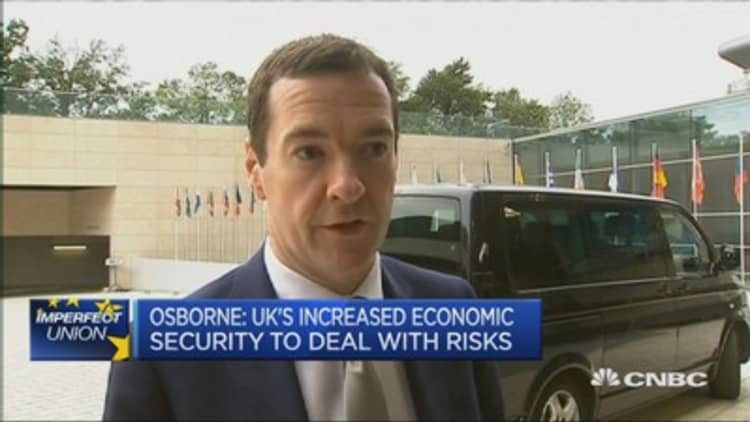
Euro zone leaders will hold an emergency summit on Monday after a the region's finance ministers failed to agree a reform-and-aid deal with Greece, making it more likely the near-bankrupt country will default on its debt at the at the end of the month.
European political leaders and economists are now preparing for financial turmoil and potential capital controls in Greece on the back of a Reuters report that over the past three days.
The large deposit outflows seen in Greece prompted the European Central Bank (ECB) to reportedly express doubts on whether Greek banks would open on Monday. The ECB is to hold a teleconference on Greece on Friday to discuss extending emergency liquidity to the country.
The emergency summit was called after the euro zone's finance ministers - the so-called Eurogroup - failed to reach a deal on reforms with Greece when the group met in Luxembourg on Thursday.
Read MoreLive blog: Greekcrisis nears zenith
The reforms would allow Greece to receive a last tranche of bailout aid worth 7.2 billion euros but sticking points remain over pension cuts. Without the money, Greece has said that it could not make a 1.54 billion euro ($1.74 billion) debt repayment to one of its senior creditors, the International Monetary Fund (IMF), on June 30.
After five months of stalled talks over reforms, Greece now has just the weekend to come up with a last-ditch plan to present to creditors in order to stave off the ignominy of a default -- and what its own central bank predicted the recently would be an "uncontrollable crisis" following such an event.
Clock ticking
There was incredulity among some euro zone ministers emerging from Thursday's meeting at Greece's apparent lack of awareness of the gravity of the situation.
Finnish Finance Minister Alexander Stubb told CNBC that Greek bailout negotiations had hit a dead end. And Belgium Finance Minister Johan Van Overtveldt said he found it strange that while "there should be a sense of urgency" on the Greek side, the country had only come up with a "few, pretty vague ideas, fully aware of the fact that the Eurogroup always works through the three institutions [overseeing Greece's bailout - the European Commission, ECB and IMF]."
Read MoreWe've hit a dead end on Greece: Finland FinMin
Although Van Overtveldt emphasized that nobody in the Eurogroup wanted to see Greece leave the euro zone, he warned that if the Greek government "keeps saying the same things and keeps the same position it's had for weeks, then there is a problem and we are obliged to look at alternative scenarios whether we like it or not."
In addition, the President of the Eurogroup, Jeroen Djisselbloem, told CNBC that the group "hadn't heard a full and credible plan tonight, that's my side of the story."
But Greek Finance Minister Yanis Varoufakis hit back at critics and what he called "disinformation" about his presentation to the Eurogroup by posting his "precise words" to the Eurogroup on Thursday on his blog site.
"I will not deny that our proposals have not instilled in you the trust that you need. And, at the same time, the institutions' proposals that [European Commission President Jean-Claude] Juncker conveyed to Prime Minister Tsipras cannot engender the hope that our citizens need. Thus, we have come close to an impasse ," he said.
"That Greece needs to adjust there is no doubt," Varoufakis continued, adding: "The question, however, is not how much adjustment Greece needs to make. It is, rather, what kind of adjustment. If by 'adjustment' we mean fiscal consolidation, wage and pension cuts, and tax rate increases, it is clear we have done more of that than any other country in peacetime."
Strange calm
The crux of the deadlock with lenders remains largely focused on Greek resistance to more austerity. Greek Prime Minister Alexis Tsipras is facing pressure from more radical leftwingers in his party, and among the populace, to withstand lenders' demands for more cuts.
Many, however, fear the uncertainty of not striking a deal. On Thursday thousands of Greeks gathered in front of the Greek parliament to call for the embattled country to stay in the euro, chanting "Europe! Europe!"
As concern mounts back at home, Tsipras is in Russia on Friday and is due to meet Russian President Vladimir Putin in the afternoon at the St. Petersburg International Economic Forum (SPIEF). There was speculation Greece might ask Russia to give it financial aid but Russia's finance minister told Reuters on Thursday that Greece had not asked it for help.
European business leaders are also concerned about Greece, with the chief executive of Italian energy company Enel, Francesco Starace, telling CNBC on Friday that everyone should be concerned about finding a solution to Greece.
"The worst possible situation is that this ambiguity keeps progressing in time without a solution...One way or another, we should see an outcome in the next few days. We would by far prefer that Greece stays in the EU, whatever that entails and I believe this is still possible," he said, speaking to CNBC at SPIEF.
European markets appear unconcerned about the proceedings, opening higher on Friday.
Michael Hewson, chief market analysts at CMC Markets commented Friday: "Despite all these concerns no-one appeared to have told the markets, which saw the euro continue to remain firm, while European markets rebounded as well, helped along in no small part by strong gains in US markets."
- By CNBC's Holly Ellyatt, follow her on Twitter @HollyEllyatt. Follow us on Twitter: @CNBCWorld


